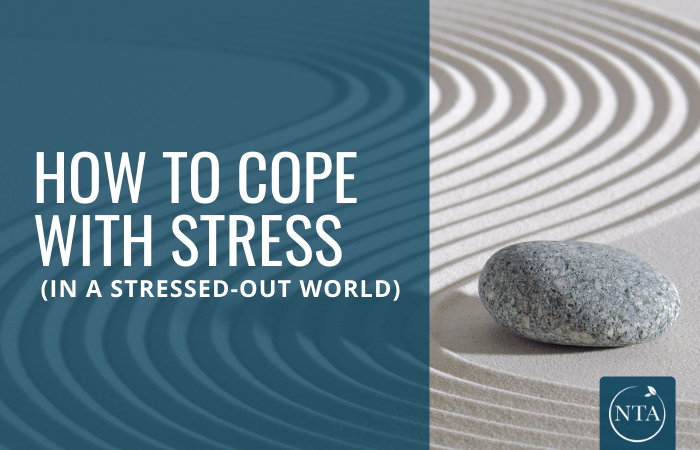How to Cope with Stress (In a Stressed-Out World)
Blog
How to Cope with Stress (In a Stressed-Out World)

Ah, stress. That sensation we reluctantly know so well. Stress as a concept is so ubiquitous in our modern lifestyle it almost needs no introduction.
You know what it is; it’s what makes your neck tense up when you’re drowning in work. It’s the exhaustion you feel when there’s too much to deal with around the house or you’re under a lot of pressure. It’s the way you drag a little after watching the news for too long.
Stress has a way of affecting us, and in fact, it has profound implications regarding our bodies and overall wellbeing.
What exactly is stress?
Stress as a set of symptoms was a term first used by a researcher named Hans Selye in the early 1930s. He defined it as “the non-specific response of the body to any demand for change.” Selye’s work was built on the foundational work of Claude Bernard and Walter Cannon, who proposed the ideas and terminology of “homeostasis.” Triggers that can provoke a stress response include physical, mental, and emotional challenges.
The most common types of stress are psychological or emotional stress and the physiological stress that comes from the body doing its best to function optimally against all the odds stacked against it, such as overwork, toxicity, and overly processed foods.
However, stress is not inherently bad. It’s a life-saving mechanism our bodies use to turn on our alarm systems — the nervous system’s “fight or flight” functions—and alert us to a situation that needs our attention. The problems arise when those alarm bells never stop ringing.
How does stress affect our bodies?
Living in a state of chronic stress puts a burden on each of our body’s systems. During times of stress, the body will use all its energy to focus on the stress response.
Depending on the intensity of the stress, this may cause digestion to take a hit. Stress impacts several necessary players in optimal digestion, including saliva production, hydrochloric acid production, the pH of the stomach, the ability of the valves and sphincters to open and close, and so on. Think of it this way: when stress is off, digestion is off.
Because stress requires blood sugar changes, chronic stress can lead to blood sugar dysregulation. It can also contribute to mineral balance issues and other consequences.
How to cope with chronic stress
Here are some strategies for dealing with stress, particularly chronic stress that can lurk in the background of daily life. As you read this list think about ways you can practically and regularly implement some of these strategies in your day-to-day.
1. Mindfulness
Many find it helpful to practice meditation, deep breathing, or breathing exercises. These can help to bring awareness to the present moment, allowing for a state of mindfulness where judgments and worries can melt away. Spending time in nature can also be also a wonderful and effective way to cope with stress.
2. Movement
Adding movement to your day can help to offset stress and bring balance back to your nervous system, and ultimately, your life. There are many forms of movement to choose from, and everyone has different lifestyles, preferences, and levels of accessibility.
When it comes to movement, the most important thing is not what you do but that you do it. That means do what works for you— whether that’s Olympic lifting or jumping rope or vacuuming or dancing or taking a walk. It’s all beneficial.
Everyday actions can be both a mindfulness and movement practice. For example, when you sweep the floor, sweep with your whole body. When you stir a pot, stir from the hips, not just your wrist. When you reach for something on the top shelf, use it as an opportunity stretch from your feet on the floor through the reach of your fingers. When you walk, swing your arms and smile.
3. Nutrient-Dense, Whole Foods Diet
As we’ve discussed, chronic stress is detrimental to the body. Stress depletes several important nutrients that our bodily systems need to function properly. One way we can use nutrition to manage the consequences of chronic stress is by ensuring we include a variety of nutrients in our diets, especially the ones we use up in times of stress.
These nutrients include:
- Vitamin C
- B Vitamins
- Magnesium
- Zinc
- Omega-3 Fatty Acids
- Antioxidants
Remember, some stress is a normal part of life. Stress is also a life-saving response that your body uses to protect you.
However, our nervous system’s stress response is not meant to be activated 24/7. Chronic, never-ending stress is detrimental to human health.
There are a number of lifestyle techniques that are useful in reducing stress, including mindfulness, movement, and nutrition. Stress involves the whole body, so in coping with it, we must think holistically.
The next chance you get, take some time to do something that helps you de-stress.
Want your recipe or article to be featured on our blog? Email our team Marketing@nutritionaltherapy.com with your full name, article, a short bio in third person, and a headshot. We may feature you in an upcoming blog post.
During this call, you’ll explore and learn:
- How to create a rewarding career in holistic nutrition that will give you the confidence and competence to replace your full-time income (whether you’re new to nutrition or or using it to enhance your current services)
- How our unmatched education and instructor support sets our NTP program apart from other nutrition programs
- How graduates are successfully using their education and the many career opportunities available to you
- If the NTP program is the right fit for you and how to move forward in financing your education


